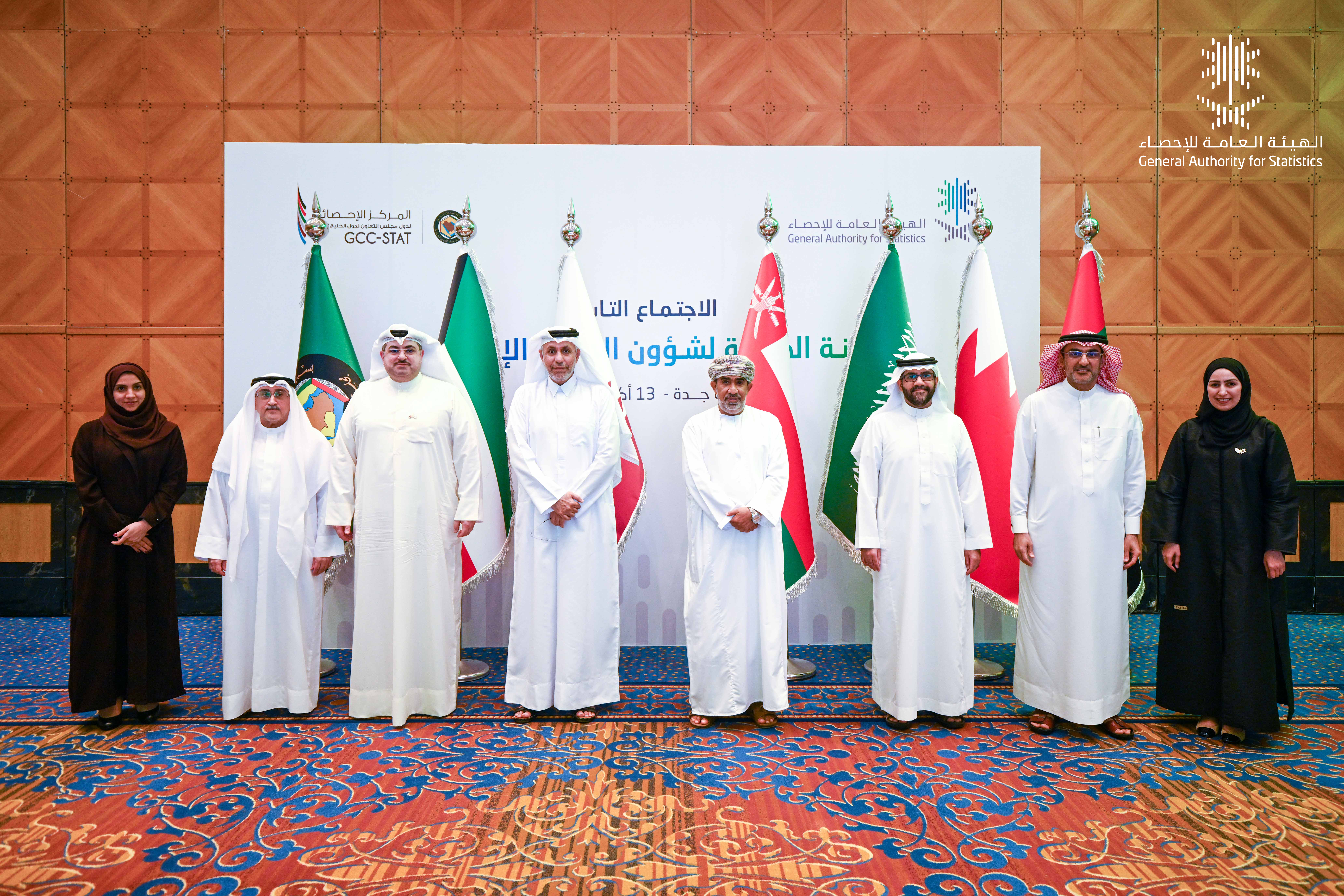
برئاسة المملكة العربية السعودية: اللجنة الدائمة لشؤون العمل الإحصائي بدول مجلس التعاون لدول الخليج العربية تعقد اجتماعها التاسع في جدة
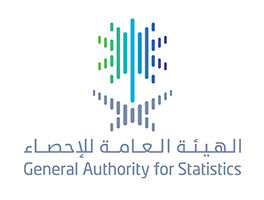
وزارة الاقتصاد والتخطيط والهيئة العامة للإحصاء توقعان مذكرة تفاهم لتعزيز الاستفادة من البيانات في تطوير السياسات الاقتصادية
The Saudi Arabia Ministry of Economy and Planning (MEP) and the General Authority for Statistics (GASTAT) signed a Memorandum of Understanding (MOU) to enhance the use of data in the development of economic policies. The MOU establishes a framework for data and knowledge sharing between the two partners, as well as sharing enhanced statistical, scientific, and economic analysis.
The agreement was signed by His Excellency Eng. Ammar Nagadi, the Vice Minister of Economy and Planning, and Dr. Fahad Aldossari, President of GASTAT.
Commenting on the MOU, His Excellency Faisal Alibrahim, Minister of Economy and Planning and Chairman of GASTAT said “Both the Ministry and GASTAT are committed to supporting the public and private sector in achieving the goals of Saudi Vision 2030. A deep understanding of our data is key to ensure we are pulling the right levers to drive the Kingdom’s economic diversification journey and facilitating economic growth for all.”
Alibrahim added “This agreement is a key milestone in our strong, and essential, partnership. It will enable us to publish a range of statistics, indicators, and products to support and empower policy and decision makers as well as assist the public in understanding policy priorities.”
Dr. Fahad Aldosari, President of the General Authority for Statistics, said: “This agreement consolidates the framework of cooperation between the Ministry and GASTAT and ensures we are delivering access to high-quality and reliable data on which future decisions for developing procedures and policies that will help us achieve the ambitions of the Saudi Vision 2030”.
The MOU comes as part of the efforts of MEP and GASTAT to support the development of statistical work and provide a new statistical dimension in the Kingdom, by benefiting from scientific and knowledge expertise in a way that contributes to achieving the goals of the Saudi Vision 2030.
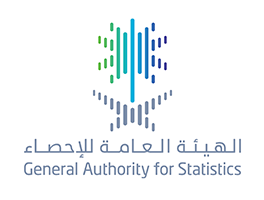
انخفاض معدل البطالة للسعوديين إلى 9.7% للربع الثاني من عام 2022م
On Thursday September 29, 2022, the General Authority for Statistics (GASTAT) issued the Labor Market Publication for the second quarter of 2022, on its official website www.stats.gov.sa
According to the Publication results, the Saudi unemployment rate has decreased to 9.7% in the second quarter of 2022, compared to 10.1% in the first quarter of 2022. The total unemployment rate (for Saudis and non-Saudis) has decreased to 5.8% in the second quarter, compared to 6.0% in the first quarter of 2022. The unemployment rate for Saudi females has also decreased in the second quarter of 2022, reaching 19.3% compared to 20.2% in the previous quarter, and the unemployment rate for Saudi males has decreased in the second quarter of 2022, reaching 4.7% compared to 5.1% in the previous quarter.
The labor force indicators in the second quarter of 2022 showed an increase in the total labor force participation rate (for Saudis and non-Saudis) as it has reached 60.8% compared to 60.4% in the first quarter of 2022.The Saudi labor force participation rate has also increased in the second quarter of 2022, reaching 51.8% compared to 50.1% in the previous quarter.
The Labor Market Publication results for the second quarter of 2022 indicated an increase in the labor force participation rate for Saudi females in the second quarter of 2022, reaching 35.6% compared to 33.6% in the previous quarter. The labor force participation rate for Saudi males has also increased in the second quarter of 2022, reaching 67.5% compared to 66.0% in the previous quarter.
GASTAT indicated that the Labor Market Publication's results depend on a household survey conducted by GASTAT that falls under the classification of (social statistics). In this survey, the information is collected through a sample representing households from the administrative regions in Saudi Arabia, and an electronic questionnaire containing a number of questions. This survey provides estimates and indicators related to the labor force of the working-age population of the age group (15 years and over) who settle in the Kingdom of Saudi Arabia. It also provides an estimate of the population (inside and outside the labor force), as well as calculating the most important labor market indicators, such as the unemployment rate, labor force participation rate, and others.
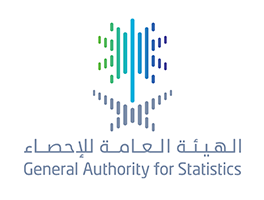
رئيس الهيئة العامة للإحصاء يهنئ القيادة باليوم الوطني الـ 92
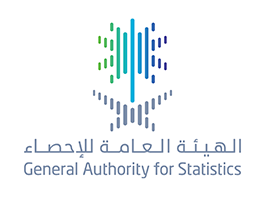
ارتفاع الصادراتِ السلعيَّة غير البترولية للمملكة خلال شهر يوليو 2022م بنسبة (26.4%)
General Authority for Statistics (GASTAT) issued on its official website www.stats.gov.sa today, Wednesday, September 21, 2022, the International Trade Publication in Saudi Arabia for July 2022. According to the publication, the value of merchandise exports in Saudi Arabia during July 2022 reached (141 billion riyals) one hundred forty-one billion riyals, compared to (89 billion riyals) eighty-nine billion riyals in July 2021, with an increase of (52 billion riyals) fifty-two billion riyals, a percentage of 58.8%.
The publication results indicated that the value of oil exports during July 2022 reached (114 billion riyals) one hundred fourteen billion riyals, compared to (67 billion riyals) sixty-seven billion riyals during July 2021, with an increase of (47 billion riyals) forty-seven billion riyals, a percentage of 68.9%.
According to the publication's results, the value of non-oil exports (including re-exports) during July 2022 reached (27 billion riyals) twenty-seven billion riyals, compared to (21 billion riyals) twenty-one billion riyals during July 2021, with an increase of (6 billion riyals) six billion riyals, a percentage of 26.4%.
The value of merchandise imports in Saudi Arabia during July 2022 reached (55 billion riyals) fifty-five billion riyals, compared to (47 billion riyals) forty-seven billion riyals during July 2021, with an increase of (8 billion riyals) eight billion riyals, a percentage of 18.3%.
GASTAT is the only official statistical reference for statistical data and information in Saudi Arabia. It carries out all the statistical work, in addition to the technical oversight of the statistical sector. It also designs and implements field surveys, conducts statistical studies and researches, analyzes data and information, and documents and archives all works of information and statistical data covering all aspects of life in Saudi Arabia from its multiple sources. Data are written, classified, and analyzed; their indicators are extracted as well.
GASTAT: Industrial Production Index Increases by 17.7% in July 2022
On Monday September 11, 2022, the General Authority for Statistics (GASTAT) revealed the results of Industrial Production Index (IPI) for the month of July 2022.
The publication results showed that during July 2022, IPI increased by 17.7% compared to the same month of last year (July 2021). This increase can be attributed to the increase in mining, quarrying, manufacturing, and electricity and gas supply.
According to the monthly publication results, the index of mining and quarrying increased by 14.1% in July 2022, compared to the same month of last year (July 2021). The manufacturing activity increased by 32.6% in July 2022, compared to the same month of last year (July 2021). The electricity and gas supply also increased by 5% in July 2022, compared to July 2021.
The results of the report indicated an increase in the General Industrial Production Index (IPI) by 1.6% in July 2022, compared to June 2022, affected by the increase in mining and quarrying, which increased by a similar percentage in July 2022. The manufacturing and electricity and gas supply increased by 0.3% and 14.6%, respectively.
GASTAT issues a number of Industry-related statistical products, including the Industrial Production Index (IPI), which is an economic indicator that reflects relative changes and evolution in the volume of industrial production quantities based on the data of the industrial production survey. It is implemented monthly and targets industrial establishments operating in the targeted activities, which are mining and quarrying, manufacturing, and electricity and gas supply.
Real GDP Grows by 12.2% in Q2 of 2022
On Wednesday September 7, 2022, General Authority for Statistics (GASTAT) released on its official website www.stats.gov.sa the report of Gross Domestic Product (GDP) and National Accounts Indicators for the second quarter of 2022. According to the estimates, real GDP recorded an increase by (12.2%) during the second quarter of 2022 compared to the same period of last year 2021.
It is worth noting that GASTAT is the only official statistical reference for statistical data and information in Saudi Arabia. It carries out all the statistical work, in addition to the technical oversight of the statistical sector. It also designs and implements field surveys, conducts statistical studies and research, analyzes data and information, in addition to documenting and archiving all works of information and statistical data that cover all aspects of life in Saudi Arabia from its multiple sources. Data are written, classified, and analyzed; their indicators are extracted as well.
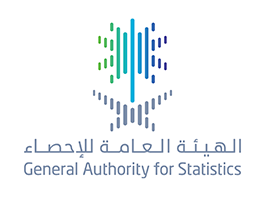
الإحصاء: تعقد اجتماعًا مع مكتب الإحصاءات البريطاني
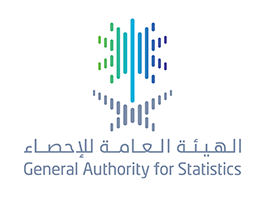
ارتفاع مؤشر الرقم القياسي للإنتاج الصناعي لشهر يونيو عام 2022م بنسبة (20.8٪)
GASTAT issued today, Wednesday, Muharram 12, 1444 AH, corresponding to August 10, 2022, the results of the Industrial Production Index (IPI) in June 2022, and published it on its official website www.stats.gov.sa
The publication results revealed the increase of IPI in June 2022 by 20.8% compared to June 2021. This was due to the increase in mining, quarrying and manufacturing activities.
The results of the monthly publication showed an increase in the index of mining and quarrying activity in June 2022 by 19.2% compared to the same month of the previous year 2021. In June 2022, the manufacturing activity index increased by 29.3% compared to June 2021, and the electricity and gas supply activity decreased by 1.2% compared to the same month of the previous year in 2021.
According to the publication results, the general index of industrial production in June 2022 increased by 1.0% compared to May 2022, affected by the increase in mining and quarrying activity, which appeared to be high by 1.0%. The electricity and gas supplies activity increased by 9.3%, while the manufacturing activity stabilized at the same level of production compared to the previous month.
GASTAT issues a number of Industry-related statistical products, including the Industrial Production Index (IPI), which is an economic indicator that reflects relative changes and evolution in the volume of industrial production quantities based on the data of the industrial production survey. It is implemented monthly and targets industrial establishments operating in the targeted activities, which are mining and quarrying, manufacturing, and electricity and gas supply.
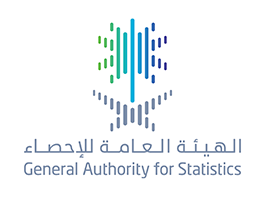
الهيئة العامة للإحصاء : ارتفاع مؤشر الرقم القياسي العام لأسعار العقارات للربع الثاني 2022م بنسبة 0.7%
GASTAT revealed on Monday, Muharram 3, 1444, corresponding to August 1, 2022, the results of the real estate price index for the second quarter of 2022, and published it on its official website www.stats.gov.sa
The publication results indicated a 0.7% increase in the general real estate price index for the second quarter of 2022, compared to the same quarter of the previous year 2021, mainly due to increase in residential real estate prices of +1.9%.
According to the publication results, the increase in residential land prices largely affected the increase in real estate prices in the second quarter of 2022, compared to the second quarter of 2021. The residential sector recorded a 1.9% increase affected by a 0.2% increase in the residential land plots prices, on an annual basis in the second quarter of 2022, due to its high relative importance in the general index. Among other residential real estate prices, the prices of villas, apartments, and houses decreased by 1.1%, 1.1% and 0.9% respectively. However, the prices of residential buildings stabilized and did not record any significant changes. The commercial sector recorded a 1.5% decrease, impacted by the decrease in the prices of commercial lands plots by 1.5%. The prices of galleries also decreased by 1.1%, while the prices of commercial centers increased by 0.1%. On the other hand, the commercial buildings prices stabilized and did not record any significant changes. The agriculture sector decreased by 0.6% affected by the decrease in agriculture land prices by -0.6%.
GASTAT is the only official statistical reference for statistical data and information in Saudi Arabia. It carries out all the statistical work, in addition to the technical oversight of the statistical sector. It also designs and implements field surveys, conducts statistical studies and researches, analyzes data and information, in addition to documenting and archiving all works of information and statistical data that cover all aspects of life in Saudi Arabia from its multiple sources. Data are written, classified, and analyzed; their indicators are extracted as well.
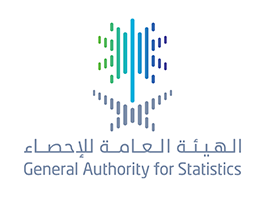
ارتفاع الصادراتِ السلعيَّة غير البترولية للمملكة خلال شهر مايو 2022م بنسبة (26.7٪)
General Authority for Statistics (GASTAT) issued on its official website www.stats.gov.sa today, Monday, Dhu al-Hijjah 26, 1443 AH, corresponding to July 25, 2022 AD, the International Trade Publication in Saudi Arabia for May 2022. Accordioning to the data contained in this publication, the value of merchandise exports in Saudi Arabia during May 2022 reached (144 billion riyals) one hundred and forty-four billion riyals, compared to (79 billion riyals) seventy-nine billion riyals May 2021, with an increase of (65 billion riyals) sixty-five billion riyals, a percentage of 83.4%.
The publication results indicated that the value of oil exports during May 2022 reached (116 billion riyals) one hundred and sixteen billion riyals, compared to (57 billion riyals) fifty-seven billion riyals during May 2021, with an increase of (59 billion riyals) fifty-nine billion riyals, a percentage of 105.5%.
According to the publication results, the value of non-oil exports (including re-exports) during May 2022 reached (28 billion riyals) twenty-eight billion riyals, compared to (22 billion riyals) twenty-two billion riyals during May 2021, with an increase of (6 billion riyals) six billion riyals, a percentage of 26.7%.
The value of merchandise imports in Saudi Arabia during May 2022 reached (54 billion riyals) fifty-four billion riyals, compared to (44 billion riyals) forty-four billion riyals during May 2021, with an increase of (10 billion riyals) ten billion riyals, a percentage of 21.8%.
GASTAT is the only official statistical reference for statistical data and information in Saudi Arabia. It carries out all the statistical work, in addition to the technical oversight of the statistical sector. It also designs and implements field surveys, conducts statistical studies and researches, analyzes data and information, in addition to documenting and archiving all works of information and statistical data that cover all aspects of life in Saudi Arabia from its multiple sources. Data are written, classified, and analyzed; their indicators are extracted as well.
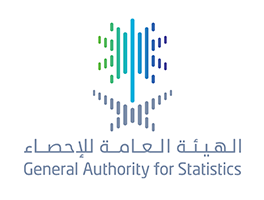
(29.7٪) يمارسون النشاط البدني المعتدل في المملكة لعام 2021م
The General Authority for Statistics (GASTAT) issued through its official website www.stats.gov.sa today, Sunday 25/12/1443 AH corresponding to 07/24/2022 AD, the Publication of the Household Sports Practice Survey for the year 2021 AD.
According to the publication results, the percentage of adults who practice physical activity (15 years and over) increased for at least 150 minutes per week during the year 2021 at the level of all regions of the Kingdom of Saudi Arabia to reach 29.7% compared to only 20% during the year 2019. This increase indicates the high awareness of society towards the practice of sports and physical activity, and indicates the provision of the basic capabilities required to help increase the time of exercise to raise the quality of life for the Kingdom’s population, which represents one of the axes of the Saudi Vision 2030. The indicator of practicing physical activity for at least 30 minutes per week is one of the indicators of the Quality of Life Program of the Vision Program, and it aims to promote the practice of sports activities in the community.
The publication results showed that 48.2% of the Kingdom’s population practice physical activity for at least 30 minutes per week, an increase of 3.2 points compared to 2019, where the percentage was 45%. The results also showed a significant difference between the percentages of males and females who practiced physical activity for at least 30 minutes per week, as the percentage of males was 54.8%, and the percentage of females was only 38.3%.
On the other hand, the World Health Organization recommends practicing physical activity, and confirms that individuals should practice moderate-intensity physical activity for at least 150 minutes per week, high-intensity physical activity for at least 75 minutes per week, or a combination of both.
According to the publication results, the percentage of the population who practice physical activity for at least 150 minutes per week in the Kingdom of Saudi Arabia reached 29.7%, an increase of 9.7 percentage points compared to 2019. The percentage of males who practice physical activity for at least 150 minutes per week was 36.1%, while the percentage of females was 20.3%.
It is noteworthy that the publication results revealed a disparity between the regions of the Kingdom in terms of the percentages of adults who practice physical activity for at least 30 minutes per week, as the lowest percentage was 41.6% in Hail Region, while the highest percentage was 51.2% in the Eastern Region. The lowest percentage of adults who practice physical activity for at least 150 minutes per week was 24.3% in Al-Jouf Region, while the highest percentage was 32.9% in the Eastern Region.
The publication results also showed that there is a gap between males and females who practice physical activity in different regions, where the lowest difference between males and females who practice physical activity for at least 30 minutes per week was in Hail Region which reached 12.6%, while the highest difference between males and females was in Tabuk Region which reached 20.1%. The results showed that the lowest difference between males and females who practice physical activity for at least 150 minutes per week was in Qassim Region with a percentage of 13.1%, and the highest difference was in the Northern Border Region, where it reached 18.9%.
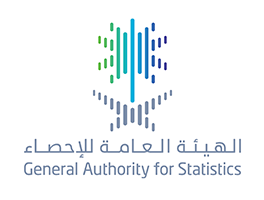
ارتفاع الصادراتِ السلعيَّة للمملكة خلال شهر أبريل 2022م بنسبة (98.0٪)
General Authority for Statistics (GASTAT) issued, through its official website www.stats.gov.sa today, Thursday, 24 Dhu al-Qa’dah 1443, corresponding to June 23, 2022, Saudi Arabia's International Trade Publication for April 2022.
The value of the Saudi Arabia's merchandise exports during April 2022 amounted to (137,119 million) one hundred thirty-seven billion one hundred nineteen million Riyals, compared to (69,252 million) sixty-nine billion two hundred fifty-two million Riyals during April 2021, with an increase of (67,867 million) sixty-seven billion eight hundred sixty-seven million Riyals, by (98.0%), according to the data of the publication.
The value of oil exports during April 2022 was (109,750 million) one hundred nine billion seven hundred fifty million Riyals, compared to (49,214 million) forty-nine billion two hundred fourteen million Riyals during April 2021, with an increase of (60,536 million) sixty billion five hundred thirty-six million riyals, by (123.0%) , the results indicated.
The value of non-oil exports during April 2022 registered (27,370 million) twenty seven billion three hundred seventy million Riyals, compared to (20,038 million) twenty billion thirty-eight million Riyals during April 2021, with an increase of (7.331 million) seven billion three hundred thirty-one million riyals, by (36.6%), according to the results.
While the value of the Saudi Arabia's merchandise imports during April 2022 amounted to (55,274 million) fifty-five billion two hundred seventy-four million Riyals, compared to (49,703 million) forty-nine billion seven hundred three million Riyals during April 2021, with an increase of (5,572 million), five one billion five hundred seventy two million Riyals, by (11.2%).
Appointment of Dr. Fahad Al-Dossari as GASTAT's President
GASTAT's Board of Directors, headed by His Excellency the Minister of Economy and Planning, Mr. Faisal bin Fadhil Al-Ibrahim, issued a decision to appoint Dr. Fahad bin Abdullah Al-Dossari as GASTAT's President, starting from today, Sunday, to lead the work in GASTAT in order to achieve the goals of transformation in GASTAT, and to complete the development of the system Statistical work.
His Excellency the Minister expressed his congratulations to Dr. Al-Dossari on this occasion, wishing him success in leading GASTAT and achieving its goals during the next critical period of the strategic transformation phase.
On behalf of the members of the Board, the Minister expressed his thanks to Dr. Konrad Pesendorfer for his efforts during his presidency, and for his role in upgrading the work in GASTAT, developing its statistical products, leading the transformation project, overcoming the challenges imposed by the COVID-19 during the past two years, and implementing the Saudi Census Program 2022, looking forward to continuing his efforts as an advisor to the Chairman of GASTAT's Board of Directors.
Dr. Al-Dossari has held a number of leadership positions, the last of which was Deputy Governor of the Central Bank of Saudi Arabia, which included the areas of systems analysis, economic research, and statistics. He also had a membership in many governmental and professional committees along with boards of directors of local and international funds and banks.
GASTAT is the only official statistical reference for statistical data and information in Saudi Arabia. It carries out all the statistical work, in addition to the technical oversight of the statistical sector. It also designs and implements field surveys, conducts statistical studies and researches, analyzes data and information, in addition to documenting and archiving all works of information and statistical data that cover all aspects of life in Saudi Arabia from its multiple sources. Data are written, classified, and analyzed; their indicators are extracted as well.
GASTAT Conducts Statistical Surveys through Telephone Interview
GASTAT: General Real Estate Price Index for Q2 of 2022 Increases by 0.7%
GASTAT revealed on Monday, Muharram 3, 1444, corresponding to August 1, 2022, the results of the real estate price index for the second quarter of 2022, and published it on its official website www.stats.gov.sa
The publication results indicated a 0.7% increase in the general real estate price index for the second quarter of 2022, compared to the same quarter of the previous year 2021, mainly due to increase in residential real estate prices of +1.9%.
According to the publication results, the increase in residential land prices largely affected the increase in real estate prices in the second quarter of 2022, compared to the second quarter of 2021. The residential sector recorded a 1.9% increase affected by a 0.2% increase in the residential land plots prices, on an annual basis in the second quarter of 2022, due to its high relative importance in the general index. Among other residential real estate prices, the prices of villas, apartments, and houses decreased by 1.1%, 1.1% and 0.9% respectively. However, the prices of residential buildings stabilized and did not record any significant changes. The commercial sector recorded a 1.5% decrease, impacted by the decrease in the prices of commercial lands plots by 1.5%. The prices of galleries also decreased by 1.1%, while the prices of commercial centers increased by 0.1%. On the other hand, the commercial buildings prices stabilized and did not record any significant changes. The agriculture sector decreased by 0.6% affected by the decrease in agriculture land prices by -0.6%.
GASTAT is the only official statistical reference for statistical data and information in Saudi Arabia. It carries out all the statistical work, in addition to the technical oversight of the statistical sector. It also designs and implements field surveys, conducts statistical studies and researches, analyzes data and information, in addition to documenting and archiving all works of information and statistical data that cover all aspects of life in Saudi Arabia from its multiple sources. Data are written, classified, and analyzed; their indicators are extracted as well.

"هيئة الإحصاء" تحتفي بإطلاق التعداد العام الخامس للسكان والمساكن في المملكة
His Excellency the Minister of Economy and Planning, and Chairman of the Board of Directors of the General Authority for Statistics, His Excellency – Faisal Al-Ibrahim – has launched the data collection phase for the Saudi Census 2022. The date of Monday evening, 8th Shawwal 1443 H, which corresponds to May 9th, 2022, was approved by Royal Decree last September as the census day for the General Population and Housing Census for 1443 H. His Excellency expressed his sincere gratitude to the Custodian of the Two Holy Mosques King Salman bin Abdulaziz Al Saud and to His Royal Highness Prince Mohammed bin Salman bin Abdulaziz, Crown Prince and Deputy Prime Minister, for their kind guidance and their unlimited support for the General Authority for Statistics (GASTAT) to implement the Census.
In his speech during the ceremony, which was held in Riyadh today, His Excellency praised the great efforts made by various government agencies in the Saudi Census 2022, contributing in various roles during its preparatory phases, and appreciating what their support and contribution in the coming phases.
His Excellency Al-Ibrahim, referred to the transformation in the Kingdom under ‘Vision 2030’, pointing out that GASTAT provides accurate and reliable statistical data as a basic pillar for planning, development, creating economic and social policies, and developing plans for various sectors to achieve the Vision’s objectives and create a better future.
He stressed that GASTAT conforms to the highest international standards and uses the latest techniques to issue statistical data, by integrating various administrative records, big data and statistical census information to provide accurate data.
His Excellency explained that the Saudi Census 2022 is the first digital census in the history of the Kingdom, using a self-enumeration feature which allows heads of households to conveniently fill the census questionnaire on their own without the need for the census interviewer’s visit. In addition to self-enumeration, 30,000 census interviewers will visit households to collect information, all while upholding the highest levels of confidentiality.
His Excellency also praised the wide participation of Saudi women in the Saudi Census 2022, whether through their leadership positions or by contributing in the field operation, stressing that it was an extension of the Kingdom’s approach to empowering women and increasing their contribution to the national economy.
His Excellency Faisal Al-Ibrahim urged the Kingdom’s residents and citizens to participate in the census by completing its questionnaire through the various available options, considering it as a national duty, a societal responsibility, and an opportunity to build a better future for the Kingdom.
The President of GASTAT, Dr. Konrad Pesendorfer clarified that the Saudi Census 2022 is the beginning of a new era of statistical knowledge in the Kingdom, describing it as an innovative digital census, and indicating that it will provide detailed information to help planners and policymakers.
Dr. Pesendorfer pointed out that GASTAT is helping with the Kingdom’s developments by investing in its human capabilities, as well as following a new business model of producing high quality statistics by integrating data from multiple sources. The census project is a good example of implementing this new business model as big data sources like satellite images were used in the preparation of the census, just as well as administrative data before collecting data directly from households. He explained that the Authority had improved the quality of data of major statistical products and information provided to decision makers, exemplifying GDP figures that were available earlier than they used to be.
He addressed several Saudi leaders who had worked on preparing for the Census, through a video in which they talked about the efforts made during the census operations and the roles they played.
GASTAT prepared the Census project based on the best international practices as implemented in countries of the G20 and in member countries of the Organization for Economic Cooperation and Development (OECD), through collaboration with experts from the United Nations (UN) and various government agencies.
The Authority is always keen to ensure the quality of data, by setting quality control procedures, as data is validated and processed during the data collection phase by a specialized quality control team, which communicates with a random sample of census participants to ensure the accuracy of the information.
After completing the data collection phase, data analyzing will start to ensure its quality and accuracy, after which the preliminary results will be published before the end of 2022, and made available to decision-makers and researchers in the public and private sectors. This will be a record time to complete the analysis and data dissemination, while some countries take more than a full year to complete the analysis and publication process.
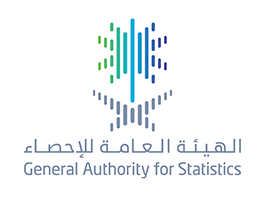
الهيئة العامة للإحصاء تعلن إتمام مرحلة " تحديث العناوين" لـ " تعداد السعودية 2022 "
The General Authority for Statistics (GASTAT) announced that it has successfully completed the works of address canvassing phase in Saudi Census 2022, which has started on January 26, 2022 and ended on March 10, 2022.
“Address Canvassing” is considered an important preparatory phase and a fundamental step in the census. In this phase, all occupied and unoccupied housing units are enumerated, numbered and linked with the head of household’s identity. Preliminary data on the numbers of households’ members are collected as well through more than 14 thousand field enumerators in order to guarantee that the census is covering all housing units during the actual enumeration phase which will be implemented in early summer this year.
In the same context, GASTAT expresses its thanks and gratitude for all citizens and residents who cooperated with field enumerators during this phase. It also appreciated the efforts of all workers in the census project who have performed their tasks and duties professionally.
GASTAT stated that best international standards and practices are applied throughout the Saudi Census 2022 to assure the achievement of census goals. Modern technologies are applied for the first time in implementing the census works, including the use of satellite images to make sure that census is covering all housing units in Saudi Arabia. Moreover, field enumerators are provided with tablets to guarantee the automation of data collection process, and raise the accuracy and rapidness of work.
Furthermore, GASTAT clarified that the actual enumeration phase in Saudi Census 2022 will start around May 10th, where citizens and residents can participate in the census by choosing the self-enumeration option which allows the completion of census questionnaire electronically, or through a field enumerator visit.
GASTAT confirmed that the participation in Saudi Census is a huge opportunity for all Saudi Arabia’s population either citizens or residents, as this contributes to achieving Saudi Vision 2030, and preparing for a better future for everyone in our beloved country.
It is worth mentioning that the Ministers Cabinet has approved the reference night of the General Census of Population and Housing (1443 H/ 2022) to be on Monday May 9, 2022.
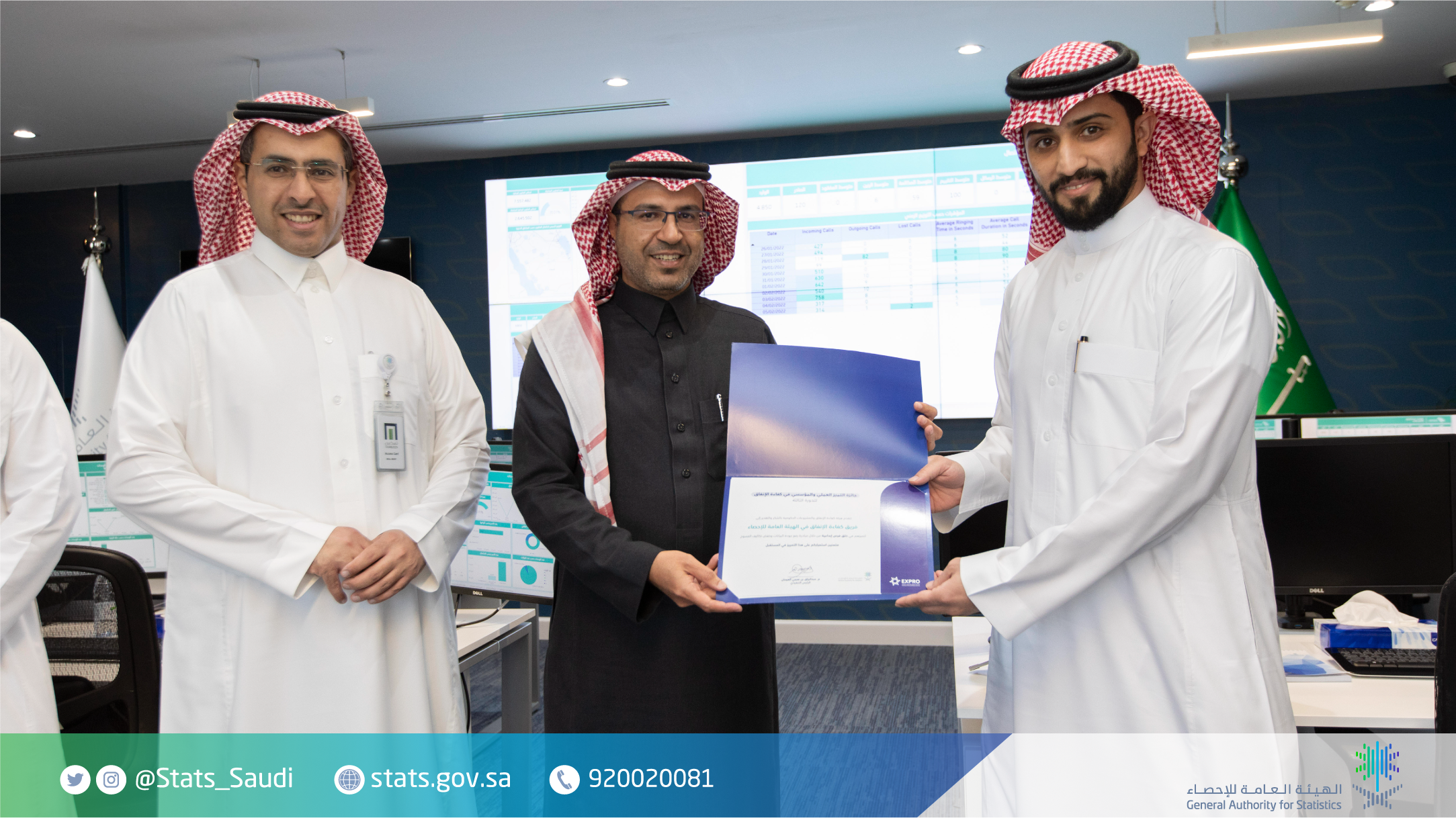
" الهيئة العامة للإحصاء " تحصد جائزة التميز العملي والمؤسسي في كفاءة الإنفاق
The General Authority for Statistics won the Practical and Institutional Excellence Award in Spending Efficiency within the initiatives pillar to classify periodic monthly reports submitted to the Government Expenditure and Projects Efficiency Authority. The award was given in recognition of the outstanding efforts made by GASTAT in improving the quality of statistical projects, infrastructure planning, programs, initiatives and operations of the financial budget. In addition to achieving measurement indicators and standards in policies, plans and strategies relevant to the impact of expenditure, completing the applicable statutory procedures and continuously improving them, and adopting international best practices along with related technical applications in the statistical field through the formation of a working team in GASTAT under the name of “Spending Efficiency Team”.
The team is in charge to prepare monthly periodic reports and to follow up on the relevant mechanisms and standards. It also organizes the study of spending on projects, programs and initiatives in the statistical field and related financial aspects over the medium and long term, and their alignment with the financial sustainable goals for the coming years.
In the presence of the Vice President Operations, Mr. Mohammad Al-Rasheed and the Spending Efficiency Team, Mr. Ahmed Al-Arini, Director General of Financial Affairs received the award on behalf of GASTAT. He thanked the Government Expenditure and Projects Efficiency Authority for its encouragement in such initiatives and programs that significantly contribute to achieving the future aspirations of Vision 2030.
GASTAT is the only official statistical reference for statistical data and information in Saudi Arabia. It carries out all the statistical work, in addition to the technical oversight of the statistical sector. It also designs and implements field surveys, conducts statistical studies and researches, analyzes data and information, in addition to documenting and archiving all works of information and statistical data that cover all aspects of life in Saudi Arabia from its multiple sources. Data are written, classified, and analyzed; their indicators are extracted as well.
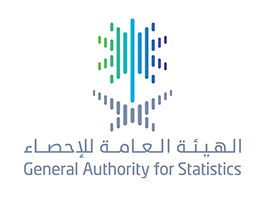
الهيئة العامة للإحصاء بالتعاون مع سدايا تتيح خدمة التحقق من هوية الباحث عبر توكلنا
The General Authority for Statistics announced the activation of the field researcher identity verification service in the Saudi Census 2022 on “Tawakkalna”, within the list of the field researcher’s digital documents. This comes in cooperation with the Saudi Data and Artificial Intelligence Authority (SDAIA), in the context of enhancing integration between government entities and strengthening efforts towards enabling digital transformation, which is one of the goals of Saudi Vision 2030.
By launching this service, the General Authority for Statistics aims to raise the level of transparency and reliability among citizens and residents, and to give the greatest degree of reassurance to the heads of households during the field researcher’s visit in the address canvassing phase, in addition to the actual census phase which will be launched on May 9, 2022, corresponding to Shawwal 8, 1443 H, in order to ensure the facilitation of field work for the "Saudi Census 2022" program. Citizens and residents will have the right to view the identification card of the field researcher through the researcher's digital documents on "Tawakkalna".
The address canvassing phase will be concluded on March 3. The actual census phase of the general population and housing census for the year 1443 H/2022 will begin on Monday evening, Shawwal 8, 1443 H, corresponding to May 9, 2022, which is the reference night of the census.

Minister of Economy and Planning inspects the "Control Room" and the "Statistical Communication Center" for the "Saudi Census 2022"
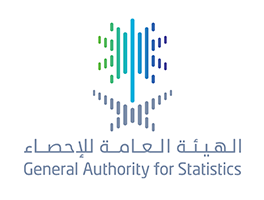
الهيئة العامة للإحصاء : بدء مرحلة تحديث العناوين لتعداد السعودية 2022 والعدُّ الفعلي في مايو المقبل
His Excellency the Minister of Economy & Planning - and Chairman of the Board of Directors of the General Authority for Statistics (GASTAT) - Faisal bin Fadhil Alibrahim expressed his gratitude for the care and patronage by the Custodian of the Two Holy Mosques, King Salman bin Abdulaziz Al Saud, and His Royal Highness Crown Prince Mohammed bin Salman bin Abdulaziz, towards Saudi Arabia’s upcoming housing and population census.
In relation to the received direction to commence the census on May 9, 2022 (Shawwal 8, 1443) His Excellency stated that, “The Saudi census - which GASTAT conducts every ten years - is a vital pillar for the planning and policymaking required to achieve our Vision 2030 goals.” He praised the tremendous support the census operations have received from government agencies, as well as the cooperation from citizens and residents during last year’s pilot census, all of which has contributed significantly in enhancing GASTAT’s readiness to conduct the proper census process this year.
His Excellency encourages all residents to participate in the census as part of their national duty and social responsibility, and to cooperate with field workers in providing their data as accurately as possible. The census results will directly impact policymakers’ abilities to make evidence-based decisions that contribute to better public services and urban planning, as well as enable the private sector and investors to play their part effectively in the Kingdom’s economic development.
Alibrahim emphasizes GASTAT’s commitment to the highest standards of privacy and confidentiality when it comes to the collected census data. The Authority’s bylaws strictly prohibit any disclosure of citizens’ and residents’ data and private information (such as ID numbers, names or residency information).
His Excellency also highlights this census’s most prominent enhancements, including developing work procedures based on international best practices used in G20 countries and member countries of the Organization for Economic Cooperation and Development (OECD). Case in point, this will be the first census to make use of satellite imagery to ensure a more comprehensive coverage of the country’s regions and provinces that underwent incredible development since the last census in 2010.
Another new procedure aided by modern technology is the fact that citizens and residents have the option to fill out the census on their own via GASTAT’s website. Nevertheless, data collection and enumeration will still be available through field workers to ensure the widest coverage of all segments of the society.
Moreover, His Excellency shares that GASTAT has worked hand in hand with the Kingdom’s security authorities to employ their best practices in census operations, such as implementing secure background checks on all field enumerators and staff. Alibrahim asks everyone to cooperate with these workers, stressing that they are Saudi citizens performing an official government initiative and are enabled with all the support and protections they need to accomplish their tasks.
As with all public activities, His Excellency affirms GASTAT’s coordination and planning with the Ministry of Health to ensure that census workers always adhere to the proper precautionary measures to limit the spread of the Covid-19 virus, including fully-vaccinated field staff that are wearing masks and maintaining social distancing during household visits.
Address canvassing will commence today, January 26, and is considered an essential step towards an accurate and effective census. Field staff will begin cataloguing all inhabited and uninhabited housing units within the Kingdom and placing smart census stickers. Each sticker will have a unique QR code that will link the housing unit with its respective head of the household.
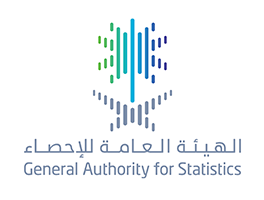
الهيئة العامة للإحصاء تنفذ مسح إحصاءات الأعمال الهيكلية للمنشآت
As part of its statistical efforts to develop the Saudi economy and support the diversity of its sources, the General Authority for Statistics (GASTAT) starts today (Sunday) January 16, 2022 working on the Business Statistics Survey. The survey, which will last for 40 days, aims to provide accurate statistical data and indicators on establishments that carry out various economic activities in Saudi Arabia.
GASTAT indicated that the data of Business Statistics Survey, which started today, will be collected using an E- questionnaire that should be completed by economic establishments either through the email or website, or through the statistical phone, where statistical researchers will contact establishments to complete the required data. Completing the survey data through the E- questionnaire will contribute to supporting policy and decision makers in Saudi Arabia to build a thorough system of procedures that would significantly and urgently develop and support economic activities to achieve constant growth and sustainability.
GASTAT requests all economic establishments to participate in this important survey by providing accurate statistical data and indicators on economic establishments in Saudi Arabia. It also called on all economic establishments to cooperate with the statistical researcher who will contact them to complete the data required for this important economic survey, given the importance of the establishments’ data in supporting the processes of decision-making and policy setting.
In a related context, GASTAT invites all establishments in both the public and private sectors along with the non-profit sector to participate in filling out the E- questionnaire of Business Statistics Survey, assuring that this survey targets all economic activities in Saudi Arabia without exception, regardless of the size, type and geographical scope of the activity.
Moreover, GASTAT explained that this Survey comes within an integrated framework with all government entities related to economic activities, as the questionnaire was built according to specific statistical criteria to guarantee the provision of accurate statistical data and indicators that measure various aspects of businesses in all economic establishments in Saudi Arabia.
According to the General Statistics Law issued by the Council of Ministers, GASTAT confirmed its full commitment of the very highest levels of confidentiality, adding that the data completed through E- questionnaires shall not be published under any circumstances. GASTATS is also committed to maintaining the confidentiality and privacy of data and information to be only used for statistical purposes through aggregate results and general indicators in accordance with the applicable regulations in Saudi Arabia.
It is worth noting that GASTAT is the only official statistical reference for statistical data and information in Saudi Arabia. It carries out all statistical work, in addition to the technical oversight of the statistical sector. It also designs and implements field surveys, conducts statistical studies and research, analyzes data and information, in addition to the documentation and archiving of all statistical information and data that cover all aspects of life in Saudi Arabia from its multiple sources. Furthermore, GASTAT registers, classifies, and analyzes data. It extracts the data indicators as well.
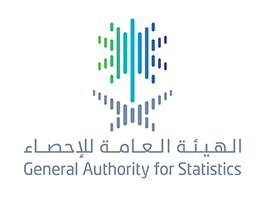
تعداد السعودية 2022م ركيزة أساسية لرؤية المملكة 2030
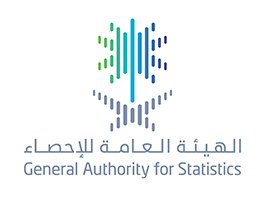
Unified electronic platform (statistical database) witnesses interest from researchers
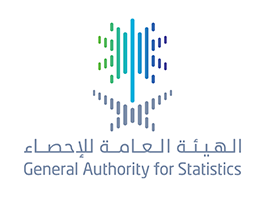
تعلن الهيئة العامة للإحصاء عن رغبتها في استئجار مبنى لموظفي الهيئة بمدينة الرياض
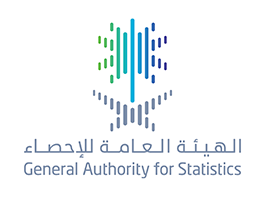
الأجهزة الإحصائية في مجلس التعاون تحتفي بيوم الإحصاء الخليجي
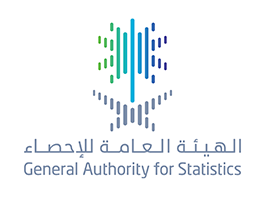
الهيئة العامة للإحصاء تطلق بوابة ترشح المتعاونين في تعداد السعودية 2022م
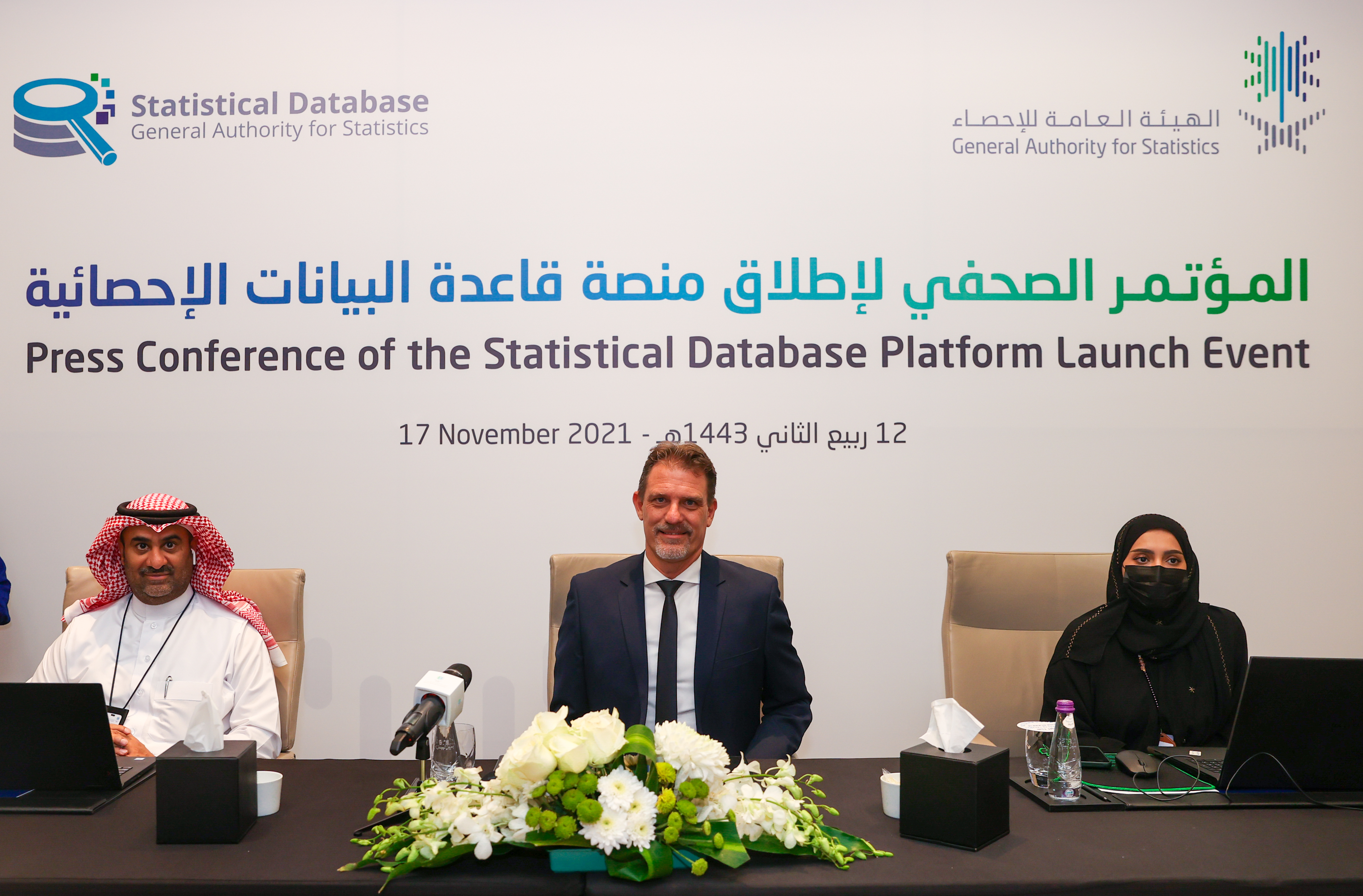
الهيئة العامة للإحصاء تطلق منصة (قاعدة البيانات الإحصائية) الموحَّدة
GASTAT launches the pilot census
Prior to conducting the General Population and Housing Census:
The General Authority for Statistics (GASTAT) has started its work of the pilot census, which targets a specific sample of governorates and households, as a step towards preparing for the implementation of the General Population and Housing Census in Saudi Arabia, after it had been postponed in 2020 due to Covid-19 and the pilot phase will finish on 12 October 2021.
The pilot census phase aims to test the Saudi census questionnaire, its operational model, and the various technical systems that will be applied in the census operations.
During the previous stage of suspending the census work, GASTAT took advantage of the opportunity to improve its tools for implementing the census and introduce various technologies and software that will contribute to raising the level of effectiveness of the census work and its results.
GASTAT will allow citizens and residents to conduct self-enumeration, where field researchers will not need to visit households, and the head of the household can electronically fill the census questionnaire through a dedicated website.
The pilot census goes through several stages, including numbering and enumerating buildings and enumerating the components of buildings such as housing units and households, in addition to counting the population and identifying their demographic characteristics, counting individuals in labor gatherings and public housing, and collecting their social, economic, and demographic characteristics. It is worth noting that only tablets will be used during this phase to collect data in the field and to extract results in an accurate and timely manner.
In order to achieve the highest level of quality control for the pilot census operations, the application of high-quality standards was followed. This will help to effectively contribute to the evaluation and study of the results, as well as in the conclusion of lessons learned, which will prove beneficial during stages of the actual census. The results of the experiment will be used to finalize the census methodology and questionnaires in accordance with international recommendations, and to meet the needs of data users.
The participation of all community members targeted in the census is a national duty that contributes mainly to the success of this experiment, and to reflect its outputs on the stage of the actual census; referring to the royal orders which emphasized on the importance of cooperating and responding to the requirements of carrying out the General Population and Housing Census, of which the pilot census phase is one of its main components.
GASTAT will adhere to the highest levels of privacy and confidentiality towards individuals residing in Saudi Arabia participating in the population census. When publishing the census results, data privacy and confidentiality principles will be adhered to, as GASTAT will not disclose to any person, entity or body any identifying information or data related to individuals, or any other data provided in the census survey. The collected data enjoys the highest levels of protection. This is done by following detailed procedures to monitor and control the disclosure of information and statistical data. Where this method ensures that no personal information relating to identity, or any of the identifying features for individuals can be disclosed.
In order to raise the level of communication, GASTAT has launched a special website for the census that includes detailed information about the concept of the census and its implementation methods. The website also includes various tools that raise awareness about the census and its importance and highlight the value of the results through its contribution towards national development plans. GASTAT has also provided through the census portal various media and awareness material that can be used in transferring knowledge, building a comprehensive national culture towards the census, and communicating with GASTAT’s employees to obtain any additional information that contributes to serving GASTAT’s clients.
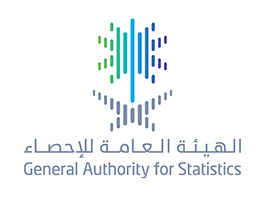
الهيئة العامة للإحصاء تستعد لتنفيذ مسح القوى العاملة للربع الرابع من عام 2021
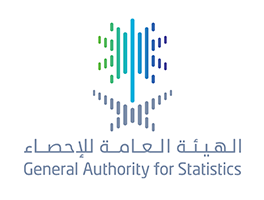
الهيئة العامة للإحصاء تستعد لتنفيذ عدد من المسوح الإحصائية عبر الهاتف
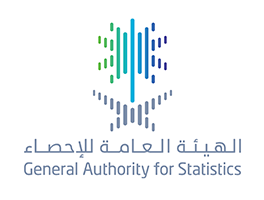
توقيع مذكرة تعاون بين الهيئة العامة للإحصاء والهيئة الملكية لمحافظة العلا
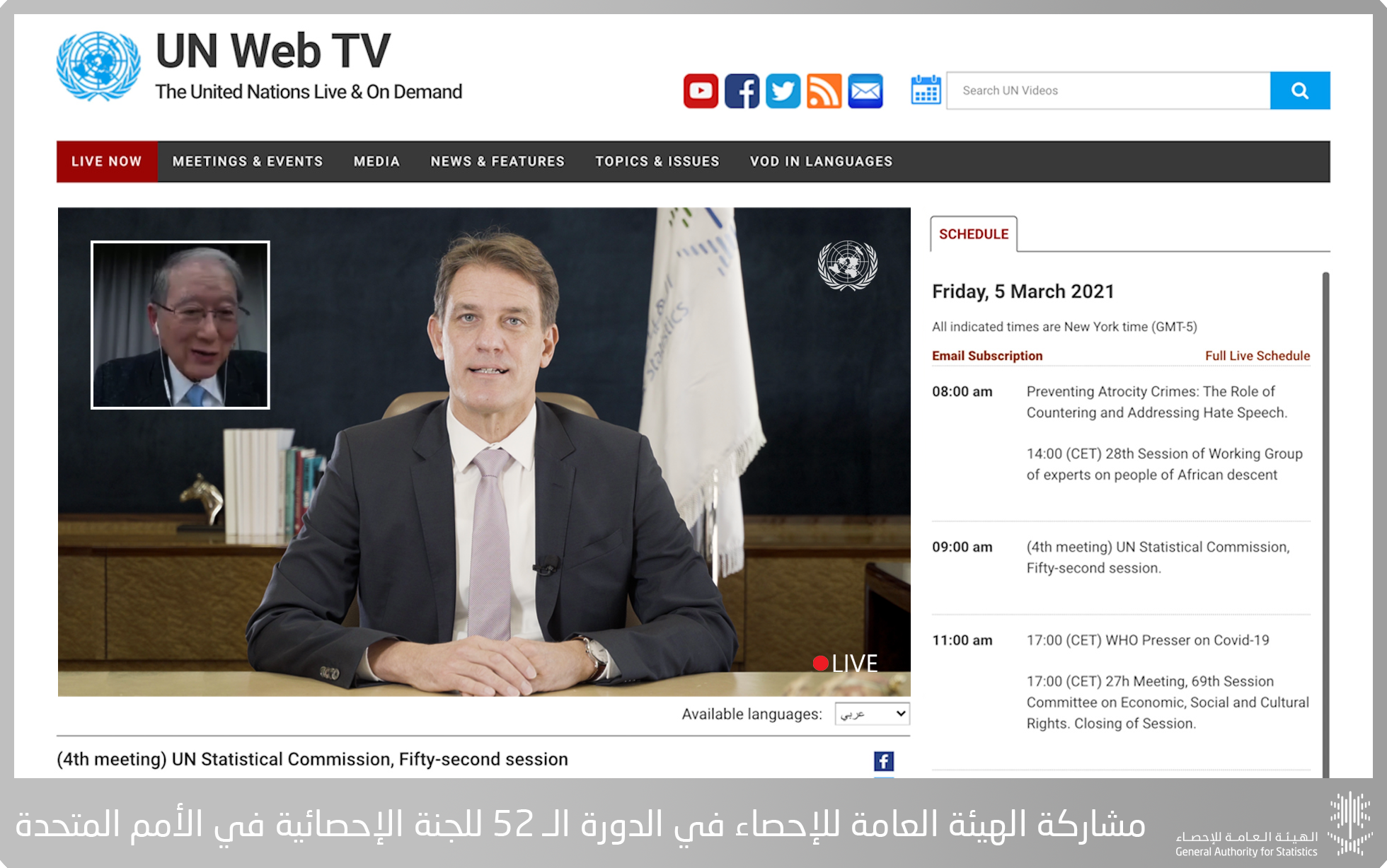
الهيئة العامة للإحصاء تشارك في أعمال الدورة (52) للجنة الإحصائية للأمم المتحدة
GASTAT concluded its participation in the work of the fifty-second session of the United Nations Statistical Commission, whose meetings were held virtually.
The first meeting was last Monday, and the proceedings of this session extended until Friday,. GASTAT was represented in these meetings by a delegation headed by His Excellency the President of the Authority, Dr. Konrad Pesendorfer, and included in its membership Dr. Akram Nour, the Vice President for Statistics, Dr. Anwar Hammad, advisor to the president, and Mr. Nayef Al-Balawi, the General Manager of International Relations and Cooperation.
The meetings of the 52nd session of the Statistical Commission discussed several topics focused on data and indicators related to sustainable development plans in member countries for the year 2030, coordination of statistical programs, in addition to the topics: economic statistics, national accounts, business and trade statistics, and what is known as environmental-economic accounting, as well the presentation and dissemination of metadata, discussing the topic of regional statistical development, managing and updating statistical systems, in addition to the future of big data, international statistical classifications, and household surveys.
Among the items covered by the work of the fifty-second session of the United Nations Statistical Commission are the review of demographic and cultural statistics, climate change statistics, and statistics related to local and global disasters. In addition, they discussed the International Comparison Program, the common open standards for the exchange and sharing of data and metadata globally, as well as ways to develop statistical capacity, and follow up on the decisions of the General Assembly and the Economic and Social Council related to policies, and the national frameworks to ensure the quality of statistical information and data, the topic of integrating statistical and geospatial information was reviewed, and the activities of the World Statistics Day were also reviewed.
At the end of the meetings of the fifty-second session of the United Nations Statistical Commission, the provisional agenda and proposed dates for the fifty-third session of the Commission were discussed, the report of the Commission on its fifty-second session was reviewed, and several of recommendations and decisions were taken.
It is noteworthy that the International Statistics Committee at the United Nations is considered the highest international statistical committee, and the Kingdom's participation in the work of the session, represented by GASTAT, stems from the Kingdom's important role at the global level, and its permanent interaction with the issues and concerns of the international community.
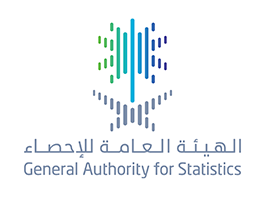
الهيئة العامة للإحصاء تقيم منتدى التصنيف السعودي الموحَّد للمهن غداً الأربعاء
Tomorrow, Wednesday, Rajab 26, 1442 AH, corresponding to March 10, 2021 AD, the General Authority for Statistics will hold a forum for the Saudi Standard Classification of Occupations to define its objectives and its applications. The Saudi Standard Classification of Occupations is considered a statistical system to classify and collect information about occupations in the Kingdom, and it is based on the International Standard Classification of Occupations (ISCO 8) issued by the United Nations Economic and Social Council.
The forum will include workshops about governance and the electronic system for the Saudi Standard Classification of Occupations, a television presentation on the classification and the efforts made to adopt and implement it, the forum will also review a set of international experiences to implement the International Standard Classification of Occupations (ISCO-8).
The Saudi Standard Classification of Occupations consists of 5 levels classified hierarchically, and each level consists of main, sub, and secondary groups, and units, in addition to the occupation’s code, name and description. The total units in the Saudi Standard Classification of Occupations are (432) units with around (2013) career.
The Saudi Standard Classification of Occupations aims to achieve a set of objectives, including unifying the names of occupations and their descriptions in all statistical sectors in the Kingdom, as well as facilitating the exchange and flow of data between various local institutions and bodies, in addition to standardizing the economic and social indicators and concepts related to the classification. The classification will improve the work environment and raise the efficiency of government support for professions in the Kingdom, and it will also help collecting all the professions in the Saudi labor market and facilitate processing its data, as well as providing a unified reference for coding and characterizing professions at the local, regional and international levels.
The application of the Saudi Standard Classification of Occupations will contribute to determining the most growing professions in the Kingdom, and support the electronic linking project between the various bodies, which will advance the e-government, and organize professions into major, sub, and secondary groups and units and also will facilitate their use in collecting and disseminating data, in addition to enhancing the reliance on the administrative records data for labor market statistics and other statistics in the Kingdom.
It is worth noting that there is a subtle difference between a job and a profession, as a job is the set of tasks and duties that a person performs for a specific employer, including self-employment, in other words, a person can have more than one job at the same time, while a profession is a group of jobs that are characterized by its main tasks and duties with a great deal of similarity.
There is a set of determinants of occupational descriptions for government and private sector professions in the Kingdom, the most prominent of which are: the occupation's code, the educational field and its level, the name of the profession, a summary of its description, its main tasks, and the behavioral and technical competencies.
It is noteworthy that information on professions in the Kingdom is collected through administrative records, censuses and statistical surveys, and the permanent technical committee formed at the General Authority for Statistics undertakes the update of the Saudi Standard Classification of Occupations in accordance with the Council of Ministers’ resolution.
The General Authority for Statistics Launches the Tourism Establishments Survey Project
the General Authority for Statistics (GASTAT) launched the Tourism Establishments Survey project, which is a comprehensive annual economic survey provided by GASTAT on the tourism sector in Saudi Arabia. The importance of this survey lies in the comprehensive data it provides about the characteristic activities of tourism, such as: number of tourism establishments, number of people working in them and their compensation, value of revenues and expenditure, capital formation and other data related to the aspect of tourism display.
The Tourism Establishments Survey aims to provide data that will help in reaching indicators to calculate the extent of tourism’s contribution to the gross domestic product, in addition to data about tourism activities that aid in reaching indicators that help in knowing the growth rates of each tourism activity, knowing its capacity of workers by gender and nationality, identifying the amount of compensation paid to workers and other expenses according to different tourism activities, knowing the volume of revenues of each tourism activity, operating and performance rates in all tourism activities, and the percentage of foreign partners' participation in the ownership of the capital of tourism activities.
This, of course, contributes to providing the needs of government agencies and authorities and the private sector in terms of statistical data and information about tourism activities. In addition, this data can be used in making local, regional and international comparisons, conducting studies and analyses, and knowing the capacity of tourism activities in terms of official and temporary jobs.
GASTAT stated that the survey will be carried out through phone calls, self-completion of data through e-mail, and the record data of the relevant government entities.
GASTAT welcomed the main partnership - aimed at achieving the aspirations of the decision maker - and the relevant ministries and authorities as well as investors in the tourism sector to reach high-impact results that positively support the country’s efforts in developing the tourism sector. GASTAT stated that integration with government sectors in implementing high-impact, comprehensive surveys is a strategic step to achieve targets with greater reliability and quality.
It is worth mentioning that GASTAT is the official and only statistical reference for statistical data and information in the Kingdom of Saudi Arabia, and it carries out all statistical work, technical supervision of the statistical sector, design and implementation of field surveys, conducting statistical studies and research, analyzing data and information, and all works of documenting and preserving statistical information and data that cover all aspects of life in the Kingdom of Saudi Arabia from its multiple sources. It is also responsible for codifying, classifying, analyzing and extracting its statistical indicators.
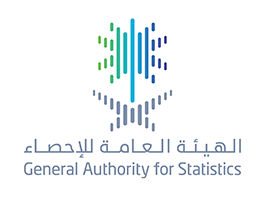
الإحصاء : نتائج مسح سوق العمل ستصدر خلال الفترة القادمة وتأخر نشرها لأهمية الفترة المستهدفة ومزيداً من المراجعات
The General Authority for Statistics (GASTAT) would like to point out that the Labor Force Survey (LFS) is one of the most important statistical products the Authority is committed to publish according to the dates specified in the Statistical Calendar. The delay on the announcement of the third Quarter of Labor Force Survey is due the GASTAT’s commitment to ensure that the data collected and procedures followed on the information provided by participants, who reached 33 thousand households within the COVID restrictions period, are up to the standards GASTAT is committed to.
GASTAT affirms that the period of Q3 2020 where the COVID pandemic and its repercussions related to had an impact on the economy that affected the Saudi Labor Market in terms of labor stability, Job loss, job availability. The review of the data and their validity is extended in order to carry out a thorough analysis of the data. GASTAT will inform the public about the new release date in due course.
The General Authority for Statistics Participates in the Gulf Statistics Day ...
The General Authority for Statistics Participates in the Gulf Statistics Day ...
The Ministerial Council of the Gulf Cooperation Council (GCC), held in Manama, Kingdom of Bahrain, on the twenty-fourth of November 2016, approved to set a day for Gulf statistics every year. The Gulf Statistics day is set to show emphasize on the importance of the society’s collaboration with statisticians, and the vital role of statistics is playing in achieving sustainable development for GCC member states. It also shows the strategic role of the Gulf statistical ecosystem in decision making and policy development in the region. The General Authority for Statistics participates with national statistical organizations (NSOs) in GCC countries in celebrating the Gulf Statistics Day this year on Thursday, the 24th of December.
The Kingdom of Saudi Arabia witnessed the beginnings of statistical work and started to produce statistics in the 1930s, where the Kingdom realized the importance of statistics and information as a pillar of development in any country that aims to advance based on solid foundations. About three decades later, The General Statistics Law was issued by a royal decree, so that the statistical work is organized under a legal framework.
The Gulf Statistics Day this year under the slogan "Smart data ... the future of official statistics” shows the importance that GCC countries give to smart data, that could facilitate data classification and data exchange, and builds the foundations to produce quality statistics. Hence, this will enhance participation to use statistics and foster institutional innovation.
The Statistics Center of the Gulf Cooperation Council was established to be the official source of data, information and statistics in relation to the countries of the Council, and to enhance the statistical work of the national statistical centers and the planning agencies in GCC countries.
The establishment of the center was approved by the Ministerial Council of the GCC countries in September 2011, and its main system was approved in December 2012 by the Supreme Council of the GCC, which is composed of Their Majesties and Highnesses Heads of Member States.
The General Authority for Statistics produces many statistical products that are important to making development plans. These products draw on multiple sources, including surveys, administrative data as well as big data. Making statistical information, analytical publications, and statistical indicators available to decision makers and the broader public and hence supporting evidence based decision making is the Authority’s main task and objective.
The General Authority for Statistics is seeking the opinion and comments of the public for the proposed Statistics Law
The General Authority for Statistics is seeking the opinion and comments of the public for the proposed Statistics Law
Based on the principles of openness and transparency, the General Authority for Statistics is inviting the public to express their opinions and suggestions regarding the proposed statistics law via e-mail (SLR@stats.gov.sa), before 09/04/1442 AH corresponding to 24/11/2020.
The statistics law project has twenty-five articles and aims to regulate the statistical work in the Kingdom of Saudi Arabia. The statistics law project has been drafted after carefully reviewing the International best practices and laws related, and based on regulations and processes to adopt laws in the Kingdom.
The statistics law project aims to enhance the statistical ecosystem, by establishing the legal framework for the development, production and dissemination of official statistics. This is to contribute to providing accurate data that serve sustainable economic development in various fields, and to provide an effective framework in order to provide reliable data and statistics. Official statistics help to properly plan for development based on evidence, and to meet the needs and requirements of the government and private sector, and to fulfill the Kingdom's obligations and regional and international statistical requirements such as the ones by the Arab League, ESCWA, the United Nations, the International Monetary Fund, the G20 and others.
It is agreed by many officials, senior planners, experts and specialists around the world on the importance of accurate data and information for sustainable development in various fields and sectors of work and production. Based on this, the General Authority for Statistics provides accurate and reliable official statistics, information and indicators about the Kingdom's economy and the society in Saudi Arabia. Educational, environmental and various activities, and the living conditions of citizens and residents in the Kingdom, classifying these data, analyzing them and issuing them according to scientific standards in the statistical field, on the basis that the General Authority for Statistics (GASTAT) is the official body responsible for preparing official statistics in the Kingdom. GASTAT applies scientific methods in accordance with internationally recognized professional standards.
The General Authority for Statistics had provided access to the Statistics Law Project through its website to seek the opinion of the public on the articles therein, through the form below, and sending them to the e-mail SLR@stats.gov.sa before November 24, 2020. Those wishing to review the Statistics Law project documents and express an opinion can access the following link:
https://www.stats.gov.sa/en/page/295
GASTAT Releases the Real-Estate Price Index report for the 3rd Quarter 2020
GASTAT Releases the Real-Estate Price Index report for the 3rd Quarter 2020
The General Authority for Statistics (GASTAT) released on Thursday, 5 Rabie Al-Awal 1442H, , corresponding to 22/10/2020, the report of the Index of the Real- Estate Price Q3 2020 in Saudi Arabia and published it on its official website www.stats.gov.sa.com
Real- Estate Price index recorded an increase by (0.5+%) in the third quarter 2020 (compared to the same quarter of the previous year) effected by the increase of the “residential” real- estate price by (+ 2.1%), as the price of the “agricultural” real estate recorded a slight increase by (+ 0.3%), Whereas the price of the “commercial” real estate registered a decrease of (-2.5%), which limit the increase of the General index.
The report indicated that the residential piece of land prices witnesses an increase by (+ 2.1%) on an annual basis in the third quarter of 2020, which contributed to an increase in the "residential" real- estate price, which in turn led to an increase in the general index; Due to its large weight in the index, The report attributed that among other "residential" real estate villas prices increased by (+ 0.8%) and apartments prices by (+ 1.5%), while buildings prices decreased by (-0.9%) residential houses by (-3.1%) also The "agricultural" real- estate Price increased by (+ 0.3%) effected by the increase of the agricultural lands prices by (+ 0.3%).
The report pointed out that the Real- Estate Price index decreased by (-0.6%) in the third quarter of 2020 compared to the previous quarter (second quarter of 2020),Due to the decrease in the "residential" real estate average price (-0.5%) In particular the residential piece of land which witnessed a decreased by (-0.5%),among other "residential" real estate, villas prices decreased by (-0.1%), apartments prices decreased by (-0.1%) and house prices by (-0.2%) whereas Residential buildings prices increased by (+ 0.1%).
The average price of commercial real estate decreased by (-0.7%) especially the prices of commercial piece of land (-0.7%), while shops increased by (+1.0) whereas the prices of buildings and commercial centers recorded a stability and did not record any significant change, as well as the prices of agricultural lands.
It should be noted that the Real- Estate Price index is a statistical tool to measure the relative change in the Real- Estate Price in the Kingdom of Saudi Arabia, and it is based on a set of data of the real- estate transactions available at the Ministry of Justice as it is the only official reference and the source of the Real- Estate data in the Kingdom ,this data set are the result of the Electronic registration and documentation operations that takes place in the ministry, it also includes various variables in the real estate transactions such as: value, location, sector, and type, GASTAT calculates the index (Real- Estate Price) based on these variables on a quarterly basis based on the sector and the type of the property of all administrative regions In the Kingdom, the base year of this indicator is 2014.
